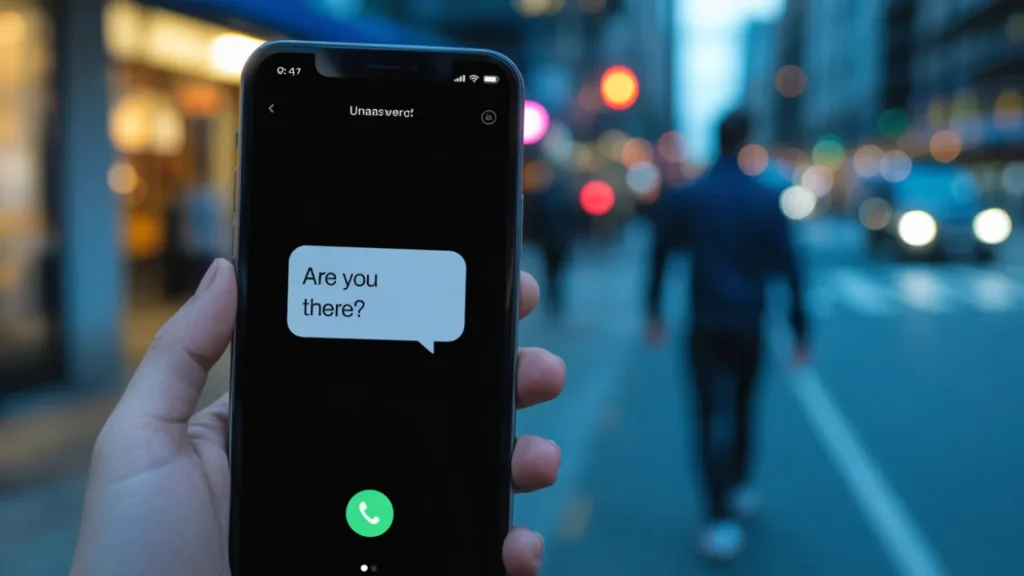What Ghosting Is
Ghosting is the act of ending all communication with someone without any explanation. This can happen in friendships, romantic relationships, or even family connections. The person being ghosted is often left without closure, which can cause stress, grief, and emotional confusion.
In psychology and mental health discussions, ghosting is viewed as an avoidance behavior. It removes the need for confrontation but often damages trust and creates long-term emotional harm. Health professionals note that while ghosting may feel like self-protection for the person doing it, it can feel like rejection or abandonment for the one on the receiving end.

Understanding Bipolar Ghosting
Bipolar ghosting happens when a person with bipolar disorder cuts off contact suddenly. This behavior can cause confusion, grief, and fear in others. It often stems from mood changes, emotional stress, or overwhelming anxiety.
A mental health professional may explain that ghosting is not always intentional. Episodes of depression, mania, or hypomania can impact social behavior and communication. Recognizing the mental health factors involved can create more empathy and understanding.
The Connection Between Bipolar Disorder and Ghosting
Bipolar disorder affects mood regulation and emotional stability. Bipolar I disorder may include severe mania and depressive episodes, while bipolar II disorder involves hypomania and depression. These shifts can influence a patient’s motivation to maintain contact.
During mania, racing thoughts, impulsivity, and stress may drive sudden decisions. In depression, low energy and feelings of shame, guilt, or hopelessness may lead to withdrawal. Both states can cause ghosting without clear explanation.
Emotional Impact on Relationships
Ghosting linked to bipolar disorder can cause intense emotion in partners, friends, and family. People often feel abandoned, confused, or rejected. Without a safe space for discussion, trust can break down.
Couples therapy can help partners explore the reasons behind the behavior. Active listening, empathy, and compassion can support healing. A health professional can guide conversations toward mutual understanding.
Common Triggers for Ghosting in Bipolar Disorder
Triggers for bipolar ghosting can include anxiety, conflict, or relationship stress. Past trauma, abuse, or domestic violence can heighten withdrawal tendencies. Alcohol or substance abuse can worsen mood swings and increase impulsivity.
Even lack of sleep can intensify symptoms. When stress levels rise, a person may avoid communication as a coping strategy. Education about these triggers helps both patients and loved ones respond with patience and insight.

The Role of Psychiatry and Medication
Psychiatry plays an important role in managing bipolar disorder. A physician or nurse practitioner may prescribe medication to stabilize mood and reduce impulsive behavior. Adherence to treatment reduces the likelihood of sudden social withdrawal.
A mental health professional may also address co-occurring conditions like major depressive disorder, anxiety disorder, or addiction. Treating these conditions can lower the risk of ghosting. Health professionals emphasize regular follow-ups to adjust care as needed.
Coping Strategies for Loved Ones
Coping with bipolar ghosting starts with understanding that it is often a symptom, not a rejection. Maintaining self-care, healthy sleep, and personal boundaries is important for emotional health. Seeking therapy can provide support and a safe space to process feelings.
If the relationship is safe, reach out calmly without pressure. Using active listening and avoiding blame encourages reconnection. Couples therapy can rebuild trust after periods of silence.
Support for the Person Experiencing Bipolar Disorder
A person with bipolar disorder may ghost others due to overwhelm, confusion, or fear. They may feel shame about past behavior or guilt for hurting others. Education about the condition helps them recognize patterns.
Working with an expert in psychology or psychiatry can improve insight and emotional regulation. Motivation to engage in treatment often grows when patients feel heard and respected. Consistent therapy and community support help create stability.
The Role of Therapy and Counseling
Therapy provides a structured environment to discuss behavior changes and triggers. Individual counseling can address impulsivity, grief, and unresolved trauma. Couples therapy can improve communication between partners affected by bipolar ghosting.
A mental health professional might recommend specific coping techniques, such as stress reduction exercises or guided empathy exercises. Over time, these skills can strengthen social behavior and reduce isolation.
Addressing Co-Occurring Issues
Bipolar disorder can co-occur with substance abuse, addiction, or alcohol misuse. These issues can worsen mood instability and increase the risk of ghosting. Health professionals focus on integrated care to address all conditions at once.
Nursing staff and health care providers can assist with medication adherence and crisis support. Inpatient or outpatient programs may be needed for patients at higher risk. Insurance coverage can help access these services.
Dual Diagnosis and Bipolar Ghosting
Dual diagnosis occurs when a person has both a mental health condition, such as bipolar disorder, and a substance abuse problem. This combination can intensify mood swings, impulsivity, and social withdrawal. Patients may ghost friends or family as a way to hide addiction or avoid difficult conversations.
Mental health professionals address dual diagnosis by treating both conditions together. This often involves a combination of psychiatry, therapy, and addiction treatment. Addressing both the mental health and substance use aspects reduces the likelihood of ghosting behaviors.
Differences Between Bipolar Disorder and Borderline Personality Disorder
While bipolar disorder involves distinct mood episodes such as mania, hypomania, and depression, borderline personality disorder (BPD) is characterized by chronic emotional instability and fear of abandonment. Both conditions can involve impulsivity, but the patterns differ. In bipolar disorder, mood changes are more episodic, while in BPD they may shift more rapidly.
Ghosting can occur in both conditions but may have different underlying reasons. In bipolar disorder, it may be tied to mood episodes, while in BPD it may be driven by intense emotional reactions and relationship fears. Mental health professionals use education, therapy, and insight to help patients understand and manage these behaviors.
Building a Supportive Community
Community resources are essential for people living with bipolar disorder. Support groups offer a safe space to share experiences and feelings without judgment. Group settings also improve social skills and reduce isolation.
Education for friends and family helps them respond with understanding instead of frustration. Local organizations often provide workshops led by mental health professionals or nurse practitioners.
How to Talk About Bipolar Ghosting
Conversations about ghosting should be approached with compassion and active listening. Using “I” statements instead of accusations can reduce defensiveness. A health professional can help mediate difficult discussions.
Acknowledging both the emotional pain and the mental health challenges involved promotes mutual respect. These talks are often more productive when both sides feel their feelings are validated.
Long-Term Recovery and Stability
Stability in bipolar disorder often requires a combination of medication, therapy, and healthy lifestyle habits. Adherence to treatment reduces mood swings that can trigger ghosting. Regular sleep, balanced nutrition, and stress management improve overall health.
Physicians and mental health professionals may encourage patients to track mood changes to spot early warning signs. This proactive approach can prevent withdrawal before it happens.
The Role of Insight and Self-Awareness
Developing insight into personal behavior patterns is a key part of recovery. Understanding the reasons for ghosting helps reduce guilt and shame. This awareness can motivate change and strengthen relationships.
Mental health professionals use education and guided reflection to help patients build self-awareness. Over time, this reduces impulsivity and supports healthier communication.
When to Seek Professional Help
Seek professional help if ghosting becomes a pattern that damages relationships or quality of life. Signs that intervention is needed include severe mood changes, substance abuse, or symptoms of psychosis.
A health professional, such as a nurse practitioner, psychiatrist, or physician, can evaluate symptoms. They can also refer patients to therapy, couples therapy, or specialized programs.

How Revival Mental Health Can Help
At Revival Mental Health, our treatment programs are built to address the complex needs of patients with bipolar disorder and related conditions. We provide therapy, psychiatry, and couples therapy to address both emotional challenges and relationship repair. Our health professionals create a safe space for patients and families to heal.
We also offer support for dual diagnosis, major depressive disorder, anxiety disorder, and personality disorder. Our team works with patients to develop coping skills, improve adherence to medication, and reduce stress triggers. Insurance options are available to help make care more accessible.
Key Takeaways
Bipolar ghosting is often rooted in mental health challenges, not a lack of care. Mania, depression, anxiety, and other symptoms can drive sudden withdrawal. Understanding, empathy, and professional support can help repair relationships.
At Revival Mental Health, therapy and psychiatry services focus on treating bipolar disorder and related conditions. We help patients and loved ones build healthier communication and stronger emotional connections.
FAQs
1. Can bipolar ghosting happen during stable mood periods? Yes, though it is more common during mood episodes, some people may withdraw during stable periods due to unresolved emotional triggers.
2. Is ghosting unique to bipolar disorder? No. While it can occur in bipolar disorder, ghosting also happens in other personality disorders, anxiety disorders, and situations involving stress or fear.
3. Can medication alone prevent ghosting? Medication can help stabilize mood but often works best when combined with therapy, lifestyle changes, and strong social support.
4. How can friends support someone after they ghost? Offer a calm and nonjudgmental message expressing willingness to reconnect. Avoid pressuring them, and suggest professional support if needed.





